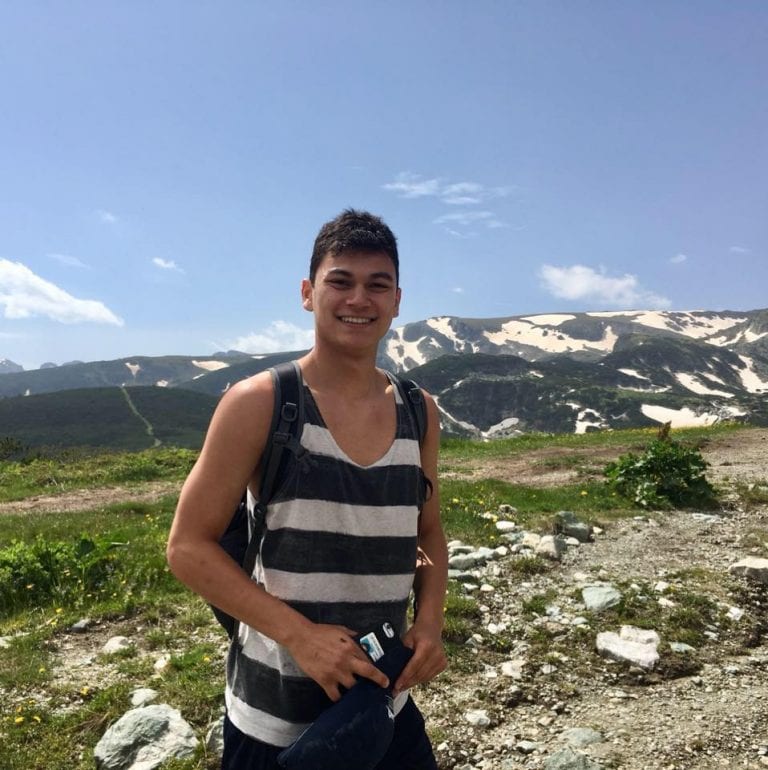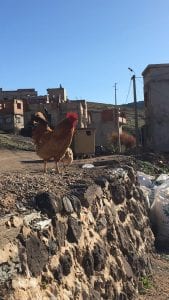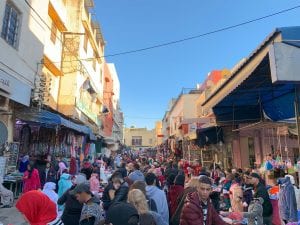Yesterday, my host mother politely asked me if it was possible that I move into the guest bedroom during my last two days in the program. She told me that an IES Rabat summer exchange student will be beginning his or her program those two days before I leave, and he or she will be moving into my bedroom. After all that my host mother had done for me, of course I said yes. But I would be lying if I said it didn’t sting a little. For the past five months I’ve felt as if I was someone special in my homestay. Like I was a part of the family. Like I was her son.
And I still was. My host mom packed me lunches, changed my sheets, and would cook cous cous in the masses for me to share with her and her five actual sons. I was a part of the family, but in a week, I would be going. Replaced by another IES Rabat exchange student in my final days. To be completely honest, I felt slightly annoyed that I would be moving out of my bedroom to make way for my replacement. Sort of like when the youngest child realizes that another baby is on the way; I couldn’t help but feel jealous.
I went for a walk later that day, taking my usual route. I said labas to my hanout man who appropriately smiled back with an L’Hamdulillah and a free Snickers. I walked along the beaches, dabbing up Nabil who urged me to throw on a wetsuit, “The waves are green, not white today, brother.” Even Abdessamad (the youngest of my five host brothers) was out on his motorcycle, screaming khouya at me as he sped by. (Abdessamad spoke no English or French. We communicated through slap-boxing. He was immense, gigantic, capable of fits of cosmic anger, sitting at the world’s border, doing his night watchman’s job. He was an Assas).
It all hit me so quick. There’s going to be a new kid moving into my bedroom. My bedroom. Suddenly, this community that I had worked so hard to become a part of was all going to be gone within a week. Where I lived, I could lose any cop through the nooks and crannies of the medina, I could show you all the best street food spots, and I had made enough friends in the medina to build a football roster. And as of yesterday, I was being reminded that I was just another study abroad student in a homestay that moved exchange students in and out like a freshmen dorm. Yeah, it stung a little.
So, what does this all have to do with my service experience in Rabat. For starters, maybe volunteering is just masturbation. Maybe volunteering is meant for the volunteer to pat themselves on the back for the work that they’ve done, and then return back to the States to proceed with their daily lives. After all, next week I will be replaced by another study abroad student who may also be coming to Rabat with bright eyes, hoping to improve the community through various acts of service. How many exchange students were there before me who volunteered in Rabat?
Yeah, I know. I sound angry. More so like a jealous boyfriend.
Maybe Mr. Healy was right. “Never write with jealousy.” But to that I’d say, I don’t think I’m jealous, I honestly think I’m just writing with sadness. Sad that I’m going to have to leave soon. My previous blog posts speak for themselves. I taught English classes, planted trees, cleaned the beaches, took care of orphaned cats and dogs, helped the homeless, and wrote research papers. However, despite my sad, angry, and jealous state I’m about to contradict myself: those acts weren’t for the benefit of my own self-esteem. If anything, by committing myself to service in Rabat I became closer with the people in the community more than I ever could’ve believed when this program began.
Of course the people of Rabat have gotten used to American students living in their city and devoting themselves to service, but it’s not like they viewed the work that was being done as any less. I’m marginal enough in this city as it is. If anything, volunteering was a mechanism for inclusion, for friendships, and for being accepted into the family. Through the acts of service that I had done, I had demonstrated to the people of Rabat that I didn’t see their home as just another Arab/Muslim country (or “Sandbox” as a stranger had so politely put it). When I taught English or picked litter off the street, I was showing that as an American that comes from a privileged world, I see the beauty in their sandstone streets, and their thundering minarets. I see the preciousness in their religion that calls the country together, or their cous cous fridays that calls families together. The long periods of idleness, the frustrations, the wish to drink out in the open, I loved it all, and I was a part of it all!
At the end of the day, the most important act of service that I had done was showing that I loved Morocco, and that I loved Rabat, and that I loved every face hidden behind the hood of a djellaba.
I cared. And yeah it sounds corny, but if anything, it’s arrogant of me to believe that I will go down as the greatest volunteer Rabat had ever seen. It’s inevitable that I will be forgotten in time, but I’m okay with that. I know that the volunteer work that I had done had made a lasting impact on the friends that I made, because I saw the true value of Rabat. And as a result, I saw the true Rabat.
Maybe that’s the whole point of volunteering. I don’t know.






